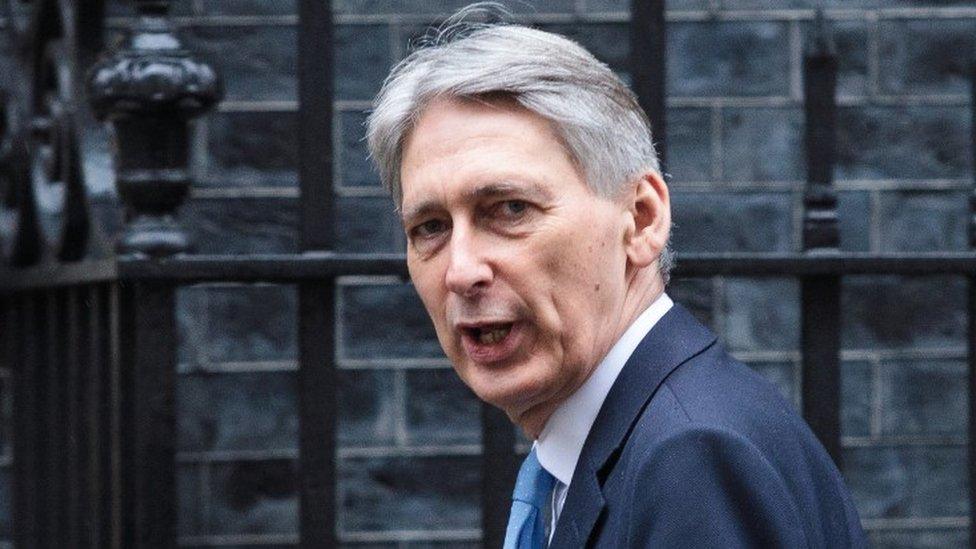Hammond’s tax burden headache
- Published
- comments

"I came into politics not to see tax rising but to see the burden of taxation falling as our economy grows and that remains my very clear political ambition."
In his interview with me two weeks ago, the chancellor could not have been clearer.
While revealing that he was uncomfortable with specific pledges not to increase income tax and national insurance, Philip Hammond says he is instinctively a "low tax politician".
How will the Conservatives deal with this sensitive issue in the manifesto launch later this month?
It's important because the manifesto is the "offer" that a party aiming for government makes to the voter.
It declares: "This is what we will achieve in the next government if we win the general election.
"And you, the voter, can test us against it."
'Tax lock'
Many close to the chancellor are keen to see some form of pledge on taxation which is specific enough to signal to voters the Tories want to cut taxes.
But broad enough not to leave the government facing anything akin to the Budget mess of two months ago.
On that occasion, Mr Hammond announced an increase in national insurance contributions for the self-employed, only to execute a U-turn a week later after critics pointed out it breached the principle - if not the letter - of David Cameron's 2015 manifesto "tax lock".
That lock said there would be no increases in income tax, national insurance or VAT.
And, despite Theresa May's promising no rise in VAT after the general election (if she is successful) at the weekend, Mr Hammond doesn't want a repeat of the 2015 tax straitjacket.
Which led John McDonnell, the shadow chancellor, to demand following the U-turn: "What will he do to fill the shortfall in a Budget he delivered less than a week ago without pursuing unfair tax increases or further cuts to public services?"
Labour says there is nothing "progressive" about "cutting taxes for the very wealthiest, and for corporations, while hitting the self-employed".
Economy stagnated
In his interview with me, Mr Hammond used the word "burden" deliberately.
First it suggests that taxes are an imposition and that people would prefer not to pay them, or certainly pay less.
Which may be true in some cases, but is not a universally held opinion.
And second, it matches the language of economic think tanks such as the Institute for Fiscal Studies and the TaxPayers' Alliance which point out that the burden of taxation is at present running at its highest level for three decades and is set to rise, not fall.
The TaxPayers' Alliance - which campaigns for lower taxes - is much referenced by the Chancellor's team.
And, by-the-by, Robert Oxley, its former head of campaigns, is now head of media communications at Conservative Central Office. Where he will remain for the duration of the campaign.
Research by the TayPayers' Alliance says that the tax burden (that's all taxes paid by individuals and businesses as a proportion of gross domestic product) was at its highest last year since 1981.
That's because taxes have risen as the economy has stagnated.
The figure is set to rise further, and by 2020 tax as a proportion of Britain's economic wealth will reach its highest level since 1969.
Stamp duty on house purchases, increases in VAT, increases in taxes for higher rate payers, cuts in tax reliefs on pension allowances and rises in insurance premiums tax have pushed the burden up to 34%.
By increasing the tax threshold - the point at which employees start paying tax - the government says it has cut taxes for millions.
Wiggle room
But income tax is not the only way we contribute to the state.
"The government's claims to have been reducing taxes simply doesn't stand up to scrutiny," said Alex Wild, research director at the TaxPayers' Alliance.
"Granted, some have been cut, but others have been raised and new ones introduced with the net result being that last year's tax burden was the highest for 35 years.
"For the average household, the amount of their income they hand over in tax has increased since 2010 and it's deeply concerning that the government sees the need for 'flexibility' to increase the tax take further when it's already set to reach levels unseen for half a century."
The TaxPayers' Alliance says that the government should cap the tax take at 35%.
That is likely to be a step too far for Mr Hammond, who knows that such a pledge could be knocked off-course by a deterioration in economic growth.
Expect some mention of the tax burden in the manifesto. And a possible pledge to reduce it, particularly for those on lower incomes.
It will be carefully phrased, though, over a number of years and with some political wriggle room.
Mr Hammond doesn't want to tie his hands any more than is necessary.